Japanese automaker Toyota has announced plans to create a model “city of the future” to test and develop new technologies.
The project will involve “building a complete city from the ground up” at the foot of Japan’s Mount Fuji, Toyota said in a statement. The company announced the plans during the yearly CES technology show in Las Vegas, Nevada.
Toyota calls the project “Woven City.” It is meant to be a model for creating “smart cities” around the world. A smart city is an area developed with high-speed internet connectivity to link major information and communication systems. These systems – powered by data and sensors - can improve living conditions relating to things like energy, transportation and health.
Experts say smart cities can be designed to greatly cut human-caused pollution, reduce traffic problems and create new uses for internet technology to affect everyday life.
The Woven City will aim to be a “living laboratory” for technologies including self-driving systems, robotics, smart homes and artificial intelligence, or AI.
Toyota says the city will be built on land where an automobile factory currently operates. The factory is set to close by the end of 2020.
The city will cover about 70 hectares of land and is designed to hold around 2,000 people. Residents could include Toyota employees and visiting researchers. The city will have its own police officers, fire and emergency services and schools.
The company says the city’s main electrical power will come from hydrogen fuel technology. The city is planned to be fully sustainable, with buildings made mostly of wood. Buildings will be made with solar equipment to produce additional electricity.
Akio Toyoda is the president of Toyota Motor Corporation. He said in a statement that the city will aim to connect people, buildings and vehicles. This will permit researchers to carry out important testing of “connected AI technology,” he said.
Toyoda added that the company welcomes cooperation on the project with partners from business or education.
City planners will divide the streets for different purposes. One part will be used for faster vehicle traffic. Another will be designed for people riding bicycles or scooters. A third part will be for walking.
The company says “homes will be built with the latest human support technologies.” This includes robots to assist with daily living. Homes will also be equipped with sensors and systems designed to observe and improve peoples’ physical and mental health.
I’m Bryan Lynn.
Bryan Lynn wrote this story for VOA Learning English, based on reports from Reuters, Agence France-Presse and Toyota. Ashley Thompson was the editor.
We want to hear from you. Write to us in the Comments section, and visit our Facebook page.
____________________________________________________________
Words in This Story
foot – n. at the bottom of
artificial intelligence – n. the development of computer systems with the ability to perform work that normally requires human intelligence
resident – n. someone who lives in a particular place
sustainable – adj. able to be used without being completely used up or destroyed





